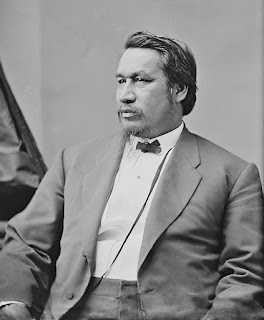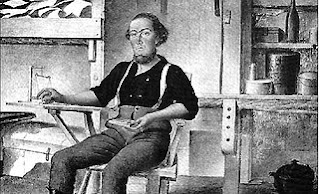Natives in the American Civil War
The Civil War wasn't just a war between Whites over Black slavery. Native tribes and Individuals from various tribes line up on either side of the issue. The Five Southeastern Tribes had been, prior to Indian Removal, prosperous farmers and planters. Many owned slaves and brought their slaves with them on the Trails of Tears. Natives of other tribes did not own slaves. Their allegiance to either the Union or Confederacy revolved around the ability of either government to protect their lands or perhaps to grant them more land, or lands they had lost. To that end, when war broke out in 1861, Natives formed troops of infantry and cavalry just as quickly as did White volunteers, and brought their own skills to bear in the war effort.
 Some of these units were raised primarily in Oklahoma and composed of mounted cavalry from the Five Southeastern Tribes. The most famous of these were the Cherokee Mounted Rifles, raised in Oklahoma by Col. Stand Watie, later a Brigadier General. Another famous unit was Thomas' Legion (69th NC Infantry), which included both infantry and cavalry raised by William Holland Thomas from Cherokee in North Carolina. Mounted Units formed from the Choctaw, Chickasaw, Creek, Seminole and Osage. Ironically, some of these men had prior military experience fighting against United States forces trying to force them off their land.
Some of these units were raised primarily in Oklahoma and composed of mounted cavalry from the Five Southeastern Tribes. The most famous of these were the Cherokee Mounted Rifles, raised in Oklahoma by Col. Stand Watie, later a Brigadier General. Another famous unit was Thomas' Legion (69th NC Infantry), which included both infantry and cavalry raised by William Holland Thomas from Cherokee in North Carolina. Mounted Units formed from the Choctaw, Chickasaw, Creek, Seminole and Osage. Ironically, some of these men had prior military experience fighting against United States forces trying to force them off their land.
Opposing them were Native regiments raised primarily in Kansas and known as the Indian Home Guard. They included tribes primarily from the Northeast, such as the Delaware, Kickapoo, Shawnee, Quapaw, and even some Osage and Cherokee. As the war drew on, some Natives who had originally signed on to the Confederacy later changed sides and fought for the Union's Indian Home Guard.
Two officers, one on each side, both the highest ranking Natives in either army. Bvt. Ely S. Parker of the Seneca, who served on the staff of General Grant, drafted the surrender documents for the Army of Northern Virginia and was present when Lee and Grant met at the McLean House in Appomattox. On the other side, Brig. Gen. Stand Watie of the Cherokee, who surrendered the last Confederate Army at Doaksville, Oklahoma on June 23, 1865.
(This post also appears in https://greatwarriorspath.blogspot.com).
 Some of these units were raised primarily in Oklahoma and composed of mounted cavalry from the Five Southeastern Tribes. The most famous of these were the Cherokee Mounted Rifles, raised in Oklahoma by Col. Stand Watie, later a Brigadier General. Another famous unit was Thomas' Legion (69th NC Infantry), which included both infantry and cavalry raised by William Holland Thomas from Cherokee in North Carolina. Mounted Units formed from the Choctaw, Chickasaw, Creek, Seminole and Osage. Ironically, some of these men had prior military experience fighting against United States forces trying to force them off their land.
Some of these units were raised primarily in Oklahoma and composed of mounted cavalry from the Five Southeastern Tribes. The most famous of these were the Cherokee Mounted Rifles, raised in Oklahoma by Col. Stand Watie, later a Brigadier General. Another famous unit was Thomas' Legion (69th NC Infantry), which included both infantry and cavalry raised by William Holland Thomas from Cherokee in North Carolina. Mounted Units formed from the Choctaw, Chickasaw, Creek, Seminole and Osage. Ironically, some of these men had prior military experience fighting against United States forces trying to force them off their land. Opposing them were Native regiments raised primarily in Kansas and known as the Indian Home Guard. They included tribes primarily from the Northeast, such as the Delaware, Kickapoo, Shawnee, Quapaw, and even some Osage and Cherokee. As the war drew on, some Natives who had originally signed on to the Confederacy later changed sides and fought for the Union's Indian Home Guard.
Two officers, one on each side, both the highest ranking Natives in either army. Bvt. Ely S. Parker of the Seneca, who served on the staff of General Grant, drafted the surrender documents for the Army of Northern Virginia and was present when Lee and Grant met at the McLean House in Appomattox. On the other side, Brig. Gen. Stand Watie of the Cherokee, who surrendered the last Confederate Army at Doaksville, Oklahoma on June 23, 1865.
(This post also appears in https://greatwarriorspath.blogspot.com).





Comments
Post a Comment